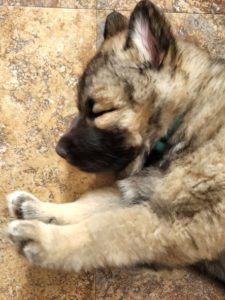Let Sleeping Dogs Lie: Chloe’s K9 Academy
 It’s been a crazy summer, with Ronin’s paw injury (healed perfectly, thank heavens) and now with Baby Kodi part time, and it’s taken a toll on my writing process, done in fits and spurts while the puppy sleeps—the rest of the time I’m saying, “no biting” when he grabs the fringe on the carpet, clamps teeth down on a shoe, etc. Puppies sleep a lot, since it’s such hard work to grow, but when they wake up, look out! That’s time to empty their walnut-sized bladder.
It’s been a crazy summer, with Ronin’s paw injury (healed perfectly, thank heavens) and now with Baby Kodi part time, and it’s taken a toll on my writing process, done in fits and spurts while the puppy sleeps—the rest of the time I’m saying, “no biting” when he grabs the fringe on the carpet, clamps teeth down on a shoe, etc. Puppies sleep a lot, since it’s such hard work to grow, but when they wake up, look out! That’s time to empty their walnut-sized bladder.
But I’ve been scolded (appropriately!) about slacking off on my blogs. So today, let’s talk about housetraining a puppy.
Trust is an important part of all dog training, to create the certainty in the dog’s mind that you know what they need and will take care of it if they just hold on a little longer. So, for elimination, the idea is to maximize the opportunities for success and minimize the messes.
This means hustling your puppy outside first thing in the morning, again immediately after eating, and probably every fifteen minutes when they’re tiny. It might be easier to confine the puppy in a laundry room or other small hard-surfaced with you at first, rather than allowing the full run of the house, so you don’t find a puddle hours later.
Take advantage of word association conditioning here. When you go out, say, “outside” or “out” or whatever word you’ll use to indicate that transition. The puppy will likely urinate pretty fast, at which time you’ll reinforce that word: “go pee” or “water the grass” or whatever you choose. For bowel movements, we say, “go potty” but you can use “unload” like Grant in A Boy & his Dog or any other term you wish. Just be sure it’s something you’re willing to say aloud, and won’t make for canine misunderstandings, as happened when Hope newly adopted Mojo, and told her mother she had groceries to “unload”! If you want a dog to use a specific part of the yard, walk him to it. Praise the dog for the act of elimination, and you may wish to reinforce the happy occasion with some play or a Cheerio.
When you go inside again, use that word—you are starting to differentiate the sacrosanct inside Den Which Shall Not Be Trashed from the Wide Outside World Potty Grounds. You are also starting to train the puppy to go on command, which is vastly helpful later, getting it out of the way before a walk through town, a road trip, etc.
Watch him carefully inside: a little dog can urinate so fast, and baby boys won’t hike a leg in warning. It helps to keep track of the last time he was out, too, so you can give him another chance to succeed rather than catching him doing the wrong thing. If your dog does make a mess inside, should you rub his nose in it and scold him? No, it’s not necessary. Just get across how disappointed you are, with “No. Not inside.” It’s worth immediately taking him out, just in case he has a little left, because you are showing him 1) where it’s appropriate and 2) contrasting your absolute joy in his Outside Peeing with your disappointment over the accident.
Puppies tend to move their bowels first thing in the morning and after each meal, so hustle them out at those times.
While you’re training, free access to water is key for your puppy. The more water, the more chances for success and the more dilute/less stinky any accident. A few hours before bed, pick up the water dish and restrict from that point on. You’ll likely have to get up in the middle of the night. Last night was the first night Kodi let us sleep through, at 13 weeks old.
If you have a dog door, you can train a puppy to use it by removing some or all of the magnets and cajoling them through, one person calling from the outside and one person showing how to bump the door open. Kodi learned the dog door ten days ago, and since then, he trots outside on his own when he needs to.
For those with no dog door, a bell system can work. String a big jingle bell or two on a ribbon and make a loop on the other end, such that it will slip over an interior doorknob at the puppy’s nose level. When it’s time to hustle the puppy out, touch the jingle bell before you open the door. Now the name of the game is to teach him that when he rings the bell, the door flies open. You can hurry this process by putting the tiniest, almost-imaginary dab of peanut butter on the bell. When he noses it, it’ll jingle, and you’ll reinforce what happens, with “Oh, outside?” and flinging open the door.
Of course, once it “clicks” the puppy might decide that Revolving Doors is a fun game, in which case you can slip the bell off the door and hang it later to signal that going outside is an option.
For those in the throes of puppy training, have patience and faith! It won’t take that long before you have a reliable, motivated dog and a clean house.
Recent Comments